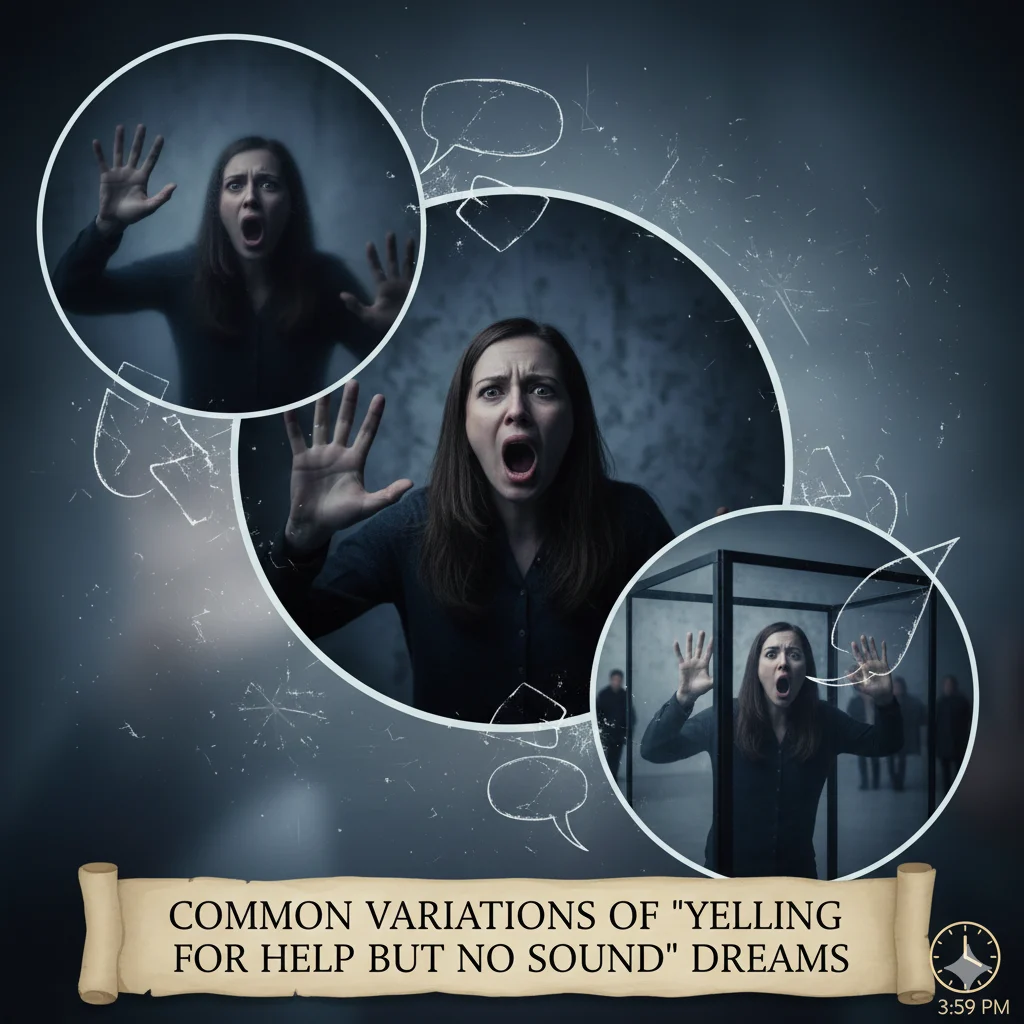Dreaming of yelling for help can feel intense and alarming, but spiritually, it often signals a deep need for guidance, support, or awakening. Such dreams may reflect inner struggles, unresolved emotions, or situations where you feel powerless in waking life.
Spiritually, yelling for help indicates that your subconscious is urging you to seek divine guidance, connect with your higher self, or ask for support from those around you. It’s a reminder to pay attention to your intuition and spiritual path, and not ignore cries for help—both within yourself and others.
Spiritually, yelling for help in a dream represents a call for guidance, emotional release, or awakening to your inner strength and support system.
General Meaning, Symbolism & Spiritual Interpretation
Dreams of yelling for help in a dream but no sound often carry multiple layers:
Symbolism of the Silent Cry
- Suppressed communication / unheard voice: Many dream dictionaries interpret voiceless screams as a sign that your voice is being stifled in waking life. You may feel you have important thoughts or feelings but no one is listening.
- Helplessness and frustration: Struggling to yell but remaining silent dramatizes feelings of powerlessness and restraint.
- Inner conflict between will and inhibition: You may want to break free emotionally, psychologically, or relationally but feel blocked.
- Spiritual signal / soul urging: Spiritually, this dream signals a call to listen to your inner truth, speak up, or address hidden wounds.
Psychological & Spiritual Insights
- Jungian perspective: Jungian psychology sees voiceless screams as messages from the unconscious, reflecting a “shadow” part of yourself that wants recognition.
- Modern therapy: Psychologists interpret these dreams as silenced anger, suppressed trauma, or emotional repression.
- Spiritual perspective: Some teachers argue that when the soul feels unheard due to fear, shame, or social conditioning, dreams dramatize this blockage so you can heal.
- Physiological mechanism (REM atonia): Your body is naturally paralyzed during REM sleep. The mind can translate this into a dream scenario where you try to scream but cannot.
These insights suggest that the dream is multi-layered—part warning, part invitation, part healing process.
Common Variations of Yelling for Help but No Sound Dreams

Yelling for Help at a Stranger
- Negative: Feeling isolated, not knowing where to turn.
- Positive: Unexpected sources of help may emerge—spiritual guides or new relationships.
- Advice: Observe the dream environment; it may hint at overlooked support.
Yelling for Help at a Loved One
- Negative: Feeling unseen or unheard in close relationships.
- Positive: Invites reconciliation, honest communication, or boundary realignment.
- Advice: Reflect on personal relationships. The dream signals a need to voice your inner truth.
Yelling for Help in a Group
- Negative: Suppressing opinions to blend in socially or professionally.
- Positive: A call to reclaim individuality and speak courageously.
- Advice: Start with journaling, meditation, or small expressions in safe spaces.
Recurring Dreams
Persistent voiceless dreams indicate ongoing unresolved issues: trauma, long-standing emotional suppression, or identity conflicts. Action is required: journaling, therapy, or spiritual mentorship.
Dreams After Trauma or Stress
- Reflect unresolved emotional shock.
- Voicelessness dramatizes how trauma may have “silenced” you emotionally.
- Positive: Encourages healing, setting boundaries, and seeking support.
Symbolic / Surreal Scenarios
- Yelling at storms, animals, or underwater scenes represents archetypal struggles or spiritual turbulence.
- The dream may urge imaginative interpretations rather than literal ones.
Case Study
Jane’s Experience
- Repeated dreams of screaming “Help!” but no sound.
- In waking life, she felt emotionally neglected in a key relationship.
- Journaling, setting small boundaries, and expressing herself gradually transformed her dreams into ones where she could speak.
Lesson: Dreams of voiceless yelling often mirror hidden emotional blockages, and healing begins when you reclaim your voice.
Cultural & Historical Perspectives
- Religious & mystical traditions: Silence can be sacred. Mystics and saints often “suffer in silence,” symbolizing spiritual growth.
- Islamic perspective: Silent cries reflect yearning for divine connection and guidance. (yelling for help in a dream but no sound islam)
- Christianity & Biblical meaning: Voiceless dreams reflect inner anguish or prophetic spiritual calls.
- Japanese & Spanish interpretations: 夢占い 助けを求める 叫ぶ, que significa soñar con pedir ayuda a gritos, 助けてと叫ぶ夢, sonhar gritando pedindo socorro — emphasize suppressed voice and the call for emotional healing.
- Symbolic roots: Across cultures, “losing voice” often represents suppression of self, social oppression, or trauma.
Personal Growth & Practical Guidance
- Dream Journaling: Record every detail, ask: What is silenced?
- Mindfulness & Inner Voice Recovery: Meditation, chanting, or visualization can strengthen confidence and expression.
- Therapeutic & Expressive Work: Journaling unsent letters, expressive arts, or therapy to process suppressed emotions.
- Habit Change & Boundaries: Practice speaking small truths daily, set healthy boundaries, affirm: “My voice matters; I speak my truth.”
Consistent inner work often transforms voiceless dreams into symbolic or expressive dreams reflecting healing.
FAQs
Q1: What does it mean when you dream about yelling for help but no sound comes out?
A: Indicates feeling unheard, suppressed, or blocked. Spiritually, it’s a call to reclaim your inner voice.
Q2: What is the spiritual meaning of screaming in a dream?
A: Highlights suppressed emotion, inner frustration, or a need to express truth.
Q3: Why can’t I scream in the dream?
A: REM atonia prevents muscle movement. Spiritually, it reflects blocked expression in waking life.
Q4: Does yelling for help in a dream have Islamic interpretation?
A: Yes, it reflects a call for divine guidance or spiritual assistance, urging reflection and prayer.
Q5: What about dreaming of someone yelling at me?
A: Indicates relational stress or projection of suppressed anger, calling for communication or boundary work.
Q6: Is this dream related to trauma?
A: Recurring voiceless dreams may reflect unresolved trauma, chronic suppression, or inner conflict. Professional support can help.
Q7: Are there cultural insights from Japanese or Spanish dream interpretations?
A: Yes, they highlight the spiritual significance of a silenced cry, often emphasizing healing, emotional release, and self-expression.
Q8: Biblical meaning of scream in a dream?
A: Symbolizes prophetic voice, spiritual struggle, or a call for action and healing.
Conclusion
Dreaming of yelling for help in a dream but no sound is a powerful signal: a part of you is unheard, a truth suppressed, and your soul is urging you to reclaim your voice. Through psychological, spiritual, and cultural lenses, this dream is not just a warning—it’s a path to healing, self-expression, and spiritual growth.
Whether it’s screaming in dream but no sound, spiritual meaning of yelling for help in a dream but no sound, or dreaming of someone yelling at you, every variation points toward integrating your inner voice and embracing your power to express your truth.

Ethan Caldwell is a spiritual scholar with extensive expertise in ancient symbolism, mythology, and esoteric dream meanings. His research blends cultural traditions with modern interpretations to offer deep and enlightening perspectives on dream symbols. Ethan’s writing style is both educational and inspiring, making complex spiritual topics easy to understand. At DreamingSign.com, he is dedicated to guiding readers through the mystical dimensions of the subconscious mind.




